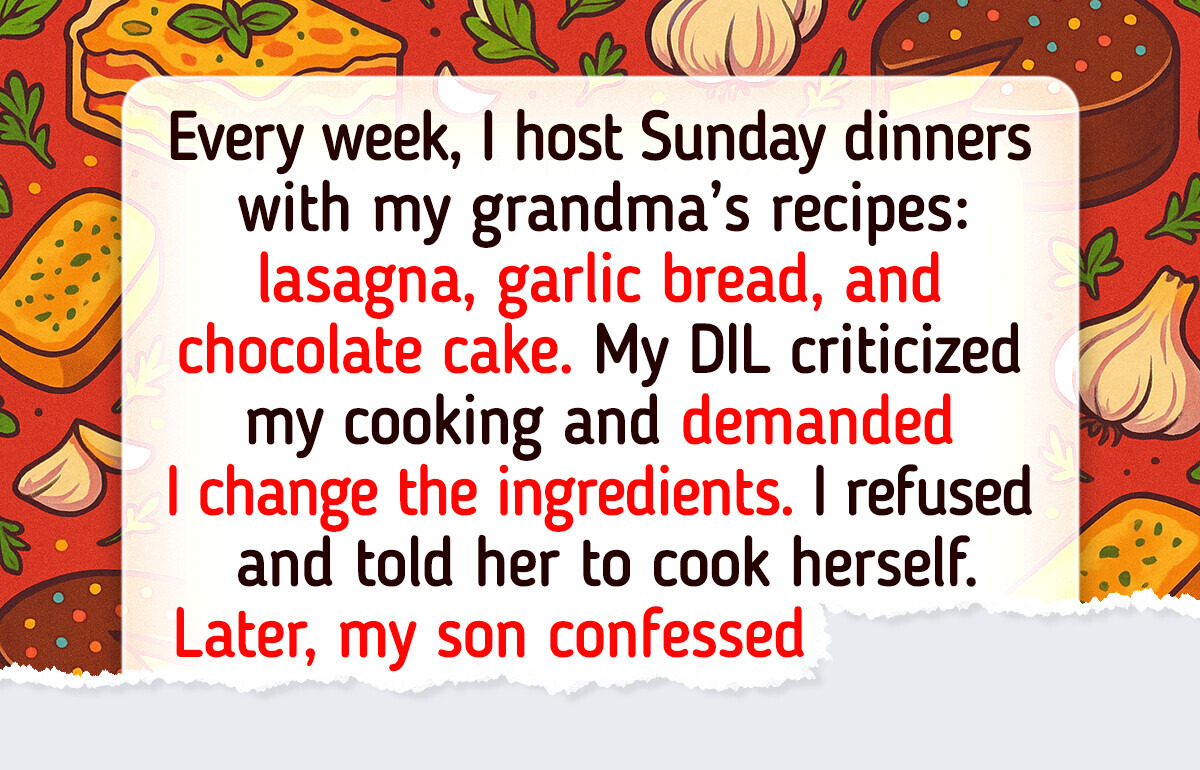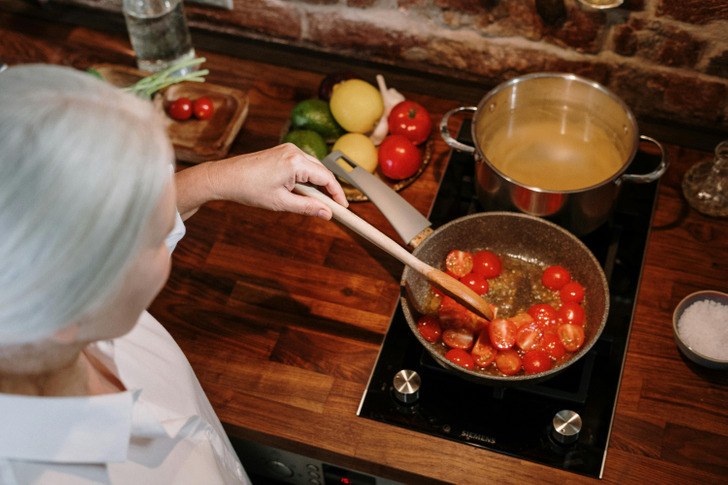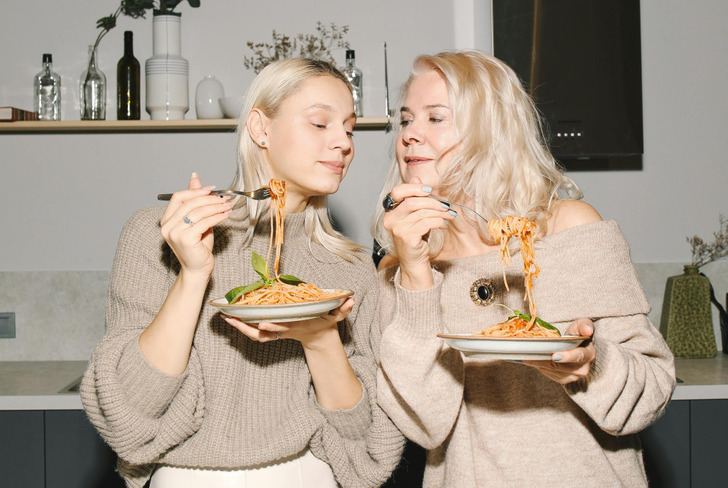Your DIL can skip family Sunday dinner & have a day to herself.
I Won’t Change My Family Recipes Just Because My DIL Thinks They’re “Unhealthy”

When tradition clashes with new-age health trends, things can get messy. A Bright Side reader’s cherished family recipes are put to the test when her daughter-in-law demands changes to her Sunday dinners. And this dinner drama is more than just about food.
Hello there, Bright Side!
I (56F) have been hosting Sunday dinners for my family every single week for decades. It’s a tradition that’s as old as I am. Same table, same cozy vibe, and yes, the same classic recipes my grandmother passed down. We’re talking homemade lasagna, buttery garlic bread, and chocolate cake. Straight-up comfort food, nothing fancy.
Now, my daughter-in-law, “Tina” (32F), married my younger son two years ago. She’s a nice enough person most of the time, but lately, she’s on some health kick. She’s started bringing her own “rules” into my kitchen, like no butter, no white flour, no sugar, no red meat. At first, I didn’t mind making a few small changes, like having a salad on standby or giving her some sparkling water. But last week, she crossed the line.
The second she walks in, she announces, loud enough for the whole house to hear, that if I “really cared about my family’s health,” I’d turn all my recipes into “clean” versions. She even brought a grocery bag full of almond flour, sugar substitutes, and oat milk and tried to take over my counter space to “help” me cook the “right” way. I was polite at first and told her these recipes are a big part of our family tradition, and I’m not changing them. She rolled her eyes and said, “So, you’re just going to clog your family’s arteries?”
That was it. I snapped a little and told her, “Tina, these recipes have been in my family for 80 years. I’ve served them to people who’ve lived well into their 90s. If you don’t want to eat them, that’s fine. Bring your own meal, but you won’t rewrite my family history in my kitchen.” She huffed and sat down with her almond flour cookies, as if that was going to make me feel bad.
After dinner, my son hit me with something that totally shocked me. He told me Tina’s doctor has been telling her to gain weight because she’s underweight, and it’s messing with her chances of getting pregnant. But no, she’s gone full “clean eating” and refuses to listen to the doctor. Now, she’s trying to get everyone else to jump on her diet train. And Sunday dinner? That’s her stage to push her agenda.
Now she’s telling everyone I “don’t care about her health,” and my other son thinks I should’ve just made one gluten-free, sugar-free dish to keep the peace. But to me, it’s not about gluten, it’s about boundaries. This is my kitchen, my tradition, and my family recipes.
So, am I wrong for standing my ground and refusing to change everything just because Tina thinks my cooking is unhealthy?
Much love,
Andrea

Is your son sure he wants to have children with this woman? Eating healthy IS important but forcing your food views and belittling others is not only wrong it is controlling and manipulative. I hate fish and raised Catholic but my mom let me eat the veggies (which I loved) and the side and a biscuit on Friday nights. No forced fish, no unhappy child. Your DIL seems like it's her way only. Bet you won't miss her when she's gone.
Thank you, Andrea, for reaching out to Bright Side. We understand how difficult it must be to navigate the growing tension with your daughter-in-law, Tina, especially as she brings her own health-conscious rules into your beloved Sunday dinners. It’s clear that these conflicts are impacting your family dynamic, and you’re trying to balance tradition with Tina’s dietary preferences. With your family’s history of close-knit meals and your deep-rooted connection to the recipes passed down through generations, it’s understandable why this situation is causing so much stress. Now, let’s explore some ways to address these challenges and foster better communication within your family.
Understand the Root of the Tension
Andrea, it’s clear that the tension between you and your daughter-in-law, Tina, is rooted in more than just food. This could be linked to deeper concerns, especially around Tina’s pregnancy struggle and her evolving health needs. Tina’s strict diet may be part of her way of managing stress or trying to feel in control during a time of change. Your son might also be caught in the middle, trying to support Tina’s choices while feeling torn between her and the family traditions you hold dear.
It’s important to approach this delicately. Consider sitting down with your son and expressing your feelings without making Tina feel attacked. Share your concerns about how her dietary preferences are affecting the family dynamics, especially during this sensitive time. Encourage an open conversation about finding common ground, balancing your cherished traditions with Tina’s health needs. This conversation may reveal the deeper emotions behind her choices, leading to a more harmonious solution.
Find Common Ground in the Kitchen
One way to approach this situation is by offering to compromise and experiment with alternative ingredients in your recipes. You’ve built family traditions around certain dishes, but that doesn’t mean there isn’t room for flexibility. Perhaps you could try making small tweaks, like using gluten-free pasta in your lasagna or offering a side dish that aligns with Tina’s dietary needs. This way, you’re respecting her health choices without abandoning your cherished recipes.
Encourage Tina to compromise too. Suggest that she experiment with a few traditional ingredients or recipes, adjusting them to fit her health requirements without feeling like she’s entirely giving up what she enjoys. By making the kitchen a space for both of you to explore, you can create meals that reflect both your family’s traditions and her dietary preferences. This mutual willingness to try new things could help bridge the gap and foster better understanding between you both.
Encourage Your DIL to Share Her Health Journey
Andrea, it’s important to be as honest as possible with Tina about what these traditional meals mean to you. Share how deeply rooted these recipes are in your family’s history and the love you’ve poured into them over the years. Let her know that you’re not trying to impose anything on her but are simply holding on to something meaningful.
At the same time, encourage Tina to be honest about her motivations behind her strict diet. Ask her why it’s so important to her and whether there are deeper emotional or health-related reasons driving her choices. This open dialogue can help both of you understand each other’s perspectives more clearly and create space for compromise. By being upfront about your feelings and encouraging Tina to do the same, you can foster a more supportive environment and find ways to respect each other’s needs without compromising your relationship or traditions.
Navigating differing dietary beliefs within families can be tough, as highlighted in this story about a sibling clash over veganism at a family reunion. It shows how challenging it can be when one person’s dietary choices clash with the expectations of others.
Comments
If your DIL wants to bring some alternative dishes she has prepared at her home, more power to her. Good to you for standing up for yourself, your kitchen and your family history. We have family favorite recipes that I would never change. They were my grandmother‘s and my mother‘s cousins.
Furthermore, these so - called "health rules" change often. Her own doctor is suggesting something is missing in her diet. The mother is not serving anything immediately dangerous, so one day of eating it won't harm DIL anyway. If the DIL would like to bring an additional dish to share or to serve herself, fine.
When she travels to foreign countries, does she insist all the recipes be changed to her possibly temporary regimen? What gall.
Related Reads
My Ex Wants Our Kids to Call His New Wife Mom—I Drew the Line

12 Stories That Prove Kindness Isn’t Weakness, It’s Grit With a Gentle Face

15 Stories That Prove Some Memories Are Impossible to Delete

14 Powerful Kindness Stories That Restored Hope in Tough Times

10 Times a Painful Truth Turned Into Kindness That Saved a Soul

MIL Invited Us to FIL’s Bday But Expected Me to Pay $100—I Refused

My Parents Refused to Fund My Education, So I Turned the Tables on Them

I Refuse to Return to the Office After My Coworker’s ‘Prank’ Revealed His Darkest Secret

15 Moments That Prove Kindness Is the Thread Holding Life Together

11 People Whose Quiet Compassion Saved Their Broken Families

My Parents Mocked Me for Being Childfree—Now They’re Living the Irony

I Gave My Grandkids Their Inheritance at 18 — Their Stepmom Says I Destroyed Her Blended Family





